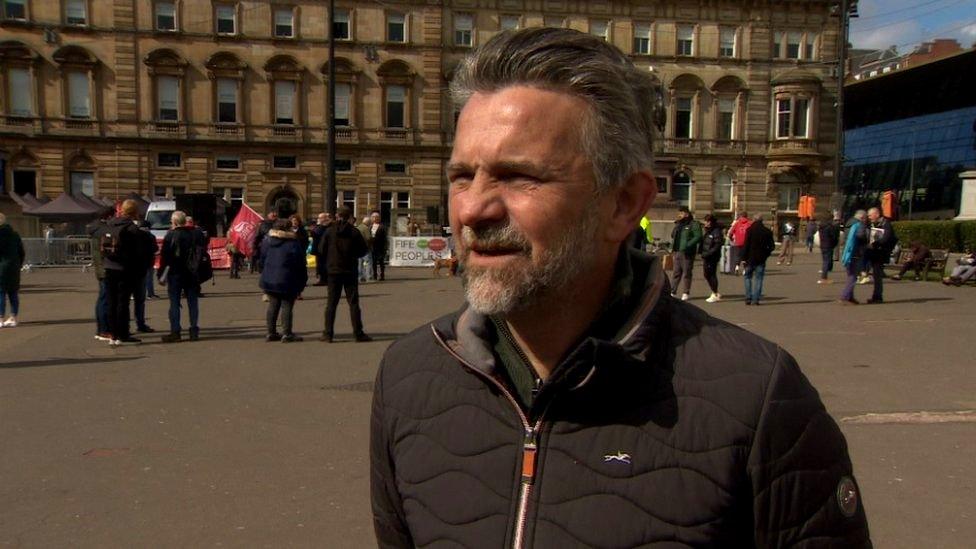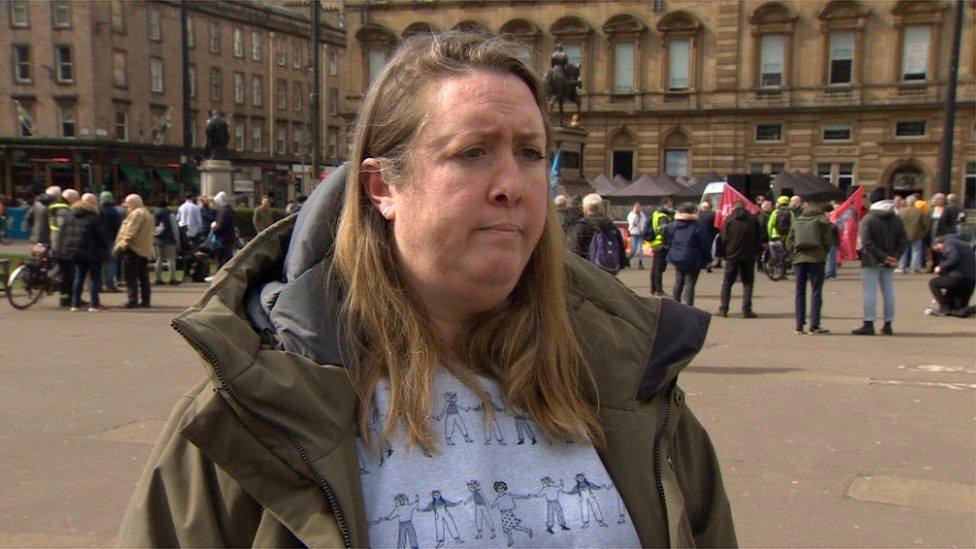Cost-of-living rally in Glasgow calls for action on poverty
- Published

Scottish TUC deputy general secretary Dave Moxham said there was "growing anger" and "despair" following the latest energy price cap rise
Protesters have gathered in Glasgow to call for action to tackle the cost-of-living crisis.
About 200 people took part in the rally at George Square a day after the energy price cap increased by 54%.
Similar events were staged across the UK organised by the Trades Union Congress and the People's Assembly.
Scottish TUC deputy general secretary Dave Moxham said there was "growing anger" and "despair" following the latest energy price cap rise.
Protests were prompted by fears that the rising bills could lead to physical and mental health issues as people ration their use of gas and electricity.
The rise in the energy cap means a household using a typical amount of gas and electricity will now pay £1,971 per year.
The cap, set every six months for England. Wales and Scotland, is designed to protect domestic customers from the volatility of wholesale energy prices.
The 4.5 million customers on prepayment meters facing an even bigger increase of £708 a year.
Mr Moxham said: "I think there is real growing anger, I think there is a lot of despair.
"We think the anger is going to grow and grow as people come to terms with the terrible cost-of-living crisis that they are facing."
Official figures, external suggest four in 10 bill-payers have been finding it difficult to afford their energy costs.
Council taxes and water bills are also going up for many people, added to the rising cost of food and household items.
One estimate suggests that a typical consumer is now facing a £73 a month increase in bills, of which about £58 is from rising energy costs.

Annie McCormack said it was becoming a "survival crisis" for some of the families her charity was helping
One of the speakers at the rally, Annie McCormack from the Kinross charity Broke Not Broken, a member of the independent food aid network, said it was becoming a "survival crisis" for some of the families they were helping.
"We talk to other food banks and we are all seeing an increased need in support with food, support with gas and energy, mental health support," she said.
"We're terrified as a charity and we have people coming in who are experiencing huge amounts of anxiety to do with what's going to come in the future.
"We were already seeing a cost-of-living crisis. What we're concerned about now is that people are actually going to experience a cost-of-survival crisis."
She said people in poverty were "incredibly creative with how far they can make their money go" but would be left with nothing to work with.
'Dangerous debts'
Chris Birt, Scotland's associate director for Scotland for the Joseph Rowntree Foundation, told BBC Radio's Good Morning Scotland programme the chancellor had to act.
"These are tough choices for the chancellor," he said.
"He sits on top of a massive budget with an ability to borrow, which is far easier than the ability of somebody who doesn't have any income to borrow, so people end up in dangerous debts, in debt to the DWP, and why anyone is in debt to the state at the moment is beyond me.
"He has to take action."
